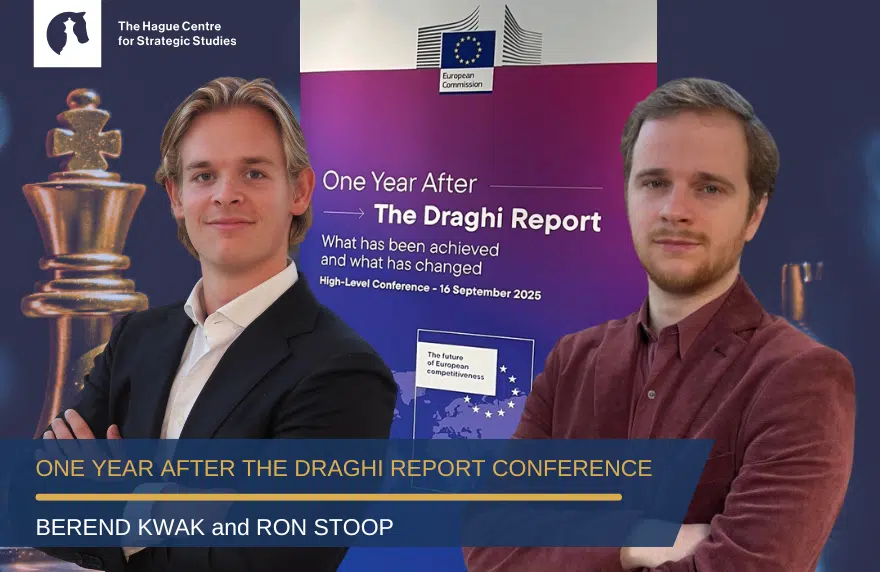The much anticipated “Draghi-report” published earlier this month has by now made its way into most parliaments, cabinet offices and boardrooms. The almost 400 pages of analysis and recommendations provide a stark warning for the EU to clean up its economic and industrial act.
The conclusions from the main report (section A) have already been covered in op-eds, policy briefs and essays, but section B of the report, which contains sector-specific in-depth analyses, still contains valuable nuggets of information.
Many of the sectors mentioned in the report are direct research areas of The Hague Centre for Strategic Studies. In this Draghi Report Series, we decided to ask our experts for their views on specific sections of this high-profile report.
For the 9th installment of our Draghi Report Series, we asked strategic analysts Lucia van Geuns, Ron Stoop, and Berend Kwak for their take on the report’s section on Energy-Intensive Industries.
– Which policy recommendations do you think are the strongest, and why?
Lucia van Geuns: The section on energy-intensive industries (EIIs) in the European Union highlights how essential these sectors—such as basic metals, chemicals, non-metallic minerals, and paper—are for both the economy and efforts to reduce carbon emissions. Since EIIs use large amounts of energy, they face challenges like high energy costs, expensive carbon prices, and the complexity of reducing their carbon emissions. These factors have caused their competitiveness to drop. Draghi suggests a combination of policy measures that are customised to each industry’s specific requirements, recognizing that each sector faces unique challenges.
Berend Kwak: Draghi emphasises the significant role of EIIs in the European economy, noting that the four most energy-heavy sectors contribute about 2% of the EU’s GDP. These industries are key to reducing Europe’s strategic dependencies, especially in areas like food security, defence, and energy. Much of the value generated by these industries is found downstream, meaning that strengthening EIIs can boost resilience throughout the supply chain. However, the competitiveness of these industries has declined, harming domestic manufacturing and increasing reliance on imports.
Ron Stoop: The need for affordable energy should be priority number one in this case. These industries face a structural issue that is at the core of the non-level playing field internationally, which is the energy costs. High energy costs have a trickle-down effect and feed all the other problems. For these industries, with energy as a primary input for their production processes, it is becoming more and more difficult to decarbonize as well as compete on costs, as energy price spikes hamper them directly in running their basic operations.
Lucia van Geuns: While the cost issue is real, we need to be realistic about how much control the EU has over it. Prices are dictated by the market, so the EU can’t fully solve the cost problem. The best it can do is offer subsidies and tax breaks to companies. However, I believe the additional problem for the EU is the overregulation of these industries. As Draghi rightly points out, the amount of bureaucracy they face is hurting their competitiveness just as much as high costs.
– Is there anything missing in the policy recommendations? What would you add?
Lucia van Geuns: Draghi highlights the importance of securing a competitive and predictable supply of natural gas during the transition to a decarbonised industry. For hard-to-abate industries, low-carbon hydrogen should be used. However, delays in EU infrastructure projects and slow progress in addressing grid congestion are reducing investor confidence. In Europe, only 4% of announced clean hydrogen projects, including both blue and green hydrogen, have reached final investment decisions. Draghi suggests supporting the shift to decarbonised solutions by securing investment and creating markets for low-emission products. He also stresses the need to prevent the relocation of production due to uneven subsidies, weaker decarbonization rules, or excessive regulatory burden.
Ron Stoop: As a broader point, the report lacks clear established principles on which decisions regarding what sector to support (and what sector not to support) are based. This leads to a situation where all sectors are supported, which is costly and will lead to extreme competition of scarce (human) resources. This can stunt specialization of sectors within the EU that can take a prominent place in the global value chain. An assessment of the desirability of energy-intensive industries vis-a-vis high-tech industries would be helpful.
– Which figure or data point in the report did you find most insightful, and why?
Berend Kwak: Figure 2 shows how a range of other industries depend on inputs from energy-intensive industries. Our manufacturing industries, which face their own problems as well, cannot do without this fundamental supply. There is a broad range of hurdles that these different industries face in the EU (e.g. high energy costs, regulatory pressures, lack of skilled workers, unfair competition, emission taxation, etc.) and causes them to leave the EU for the US, for example. If they have to maintain competitive without security of inputs from energy-intensive industries, too, we can expect the risk of deindustrialisation to increase in the EU.

– How do you view the feasibility of these plans in a European context?
Ron Stoop: The EU needs to decide which industries it wants to prioritize. It can’t support all of them simultaneously, so we must identify the key sectors that are essential and provide targeted support for those.
Lucia van Geuns: I agree with Draghi that we should promote the creation of green industrial clusters in the EU for energy-intensive industries. The Antwerp-Rotterdam-Rhine-Ruhr Area (ARRRA) could be one of these clusters. But, regions and countries with a reliable, affordable supply of low-emission energy are likely to attract energy-intensive industries (EIIs) in the future as well.
Stay tuned for the concluding instalment of the Draghi Report Series by HCSS, where we invite experts to discuss other sectorial policies in Mario Draghi’s report “The future of European competitiveness”.
Read the previous installments here:
- Draghi Report Series | Patrick Bolder on Space
- Draghi Report Series | Benedetta Girardi on Semiconductors
- Draghi Report Series | Han ten Broeke and Ron Stoop on Automotive
- Draghi Report Series | Irina Patrahau and Michel Rademaker on Critical Raw Materials
- Draghi Report Series | Tim Sweijs and Frank Bekkers on Defence
- Draghi Report Series | Lucia van Geuns and Jilles van den Beukel on Energy
- Draghi Report Series | Sofia Romansky and Jesse Kommandeur on Artificial Intelligence
- Draghi Report Series | Irina Patrahau, Ron Stoop and Berend Kwak on Clean Technologies









